A note from the Editor, Maddy Butcher:
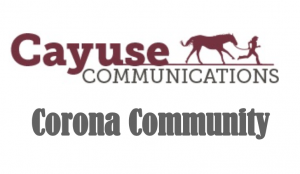 Here at Cayuse Communications, we’ve been thinking about our community of horse owners and riders. How best to come together and share during this time? We’ve reached out to friends to see how they are making lemonade from lemons and coping with the strains of the pandemic.
Here at Cayuse Communications, we’ve been thinking about our community of horse owners and riders. How best to come together and share during this time? We’ve reached out to friends to see how they are making lemonade from lemons and coping with the strains of the pandemic.
Introducing the Cayuse Corona Community, a new recurring feature. We’re from California, New Mexico, Maine, Utah, North Carolina, Ohio, Kentucky, Indiana, Virginia, and Colorado. Please join us by leaving your comments below. We’ll get through this and it’ll be better if we’re together.
Concurrent with these Cayuse Corona Community pages, we will be offering weekly giveaways, including goods from Redmond Equine, Kershaw knives, and the Cayuse Communications library of books. Read more about that here.
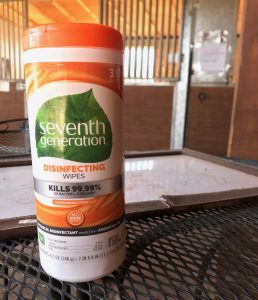
Katrin Silva sent us this pic from her barn
Think about it: Horse owners and riders are ideally positioned to weather pandemic challenges. With our horses, we can get out of our angst-y heads. We can exercise. We can enjoy warm, fuzzy hugs. All perfect antidotes to the current crisis. Stay healthy, y’all!
Cayuse Corona Community:
Robert Sheckler is a Best Horse Practices Summit steering committee member and Community Programs Manager for the Maine State Society for the Protection of Animals, New England’s premier rescue facility.
I reached him after a long day at the Windham facility:
Life at the MSSPA is sunny, snowy, and all around great, but very different from even a week ago when we closed to the public and volunteers. In more normal times, our relatively small staff is supported by a large group of volunteers who help with many of the daily barn chores along with other important tasks.
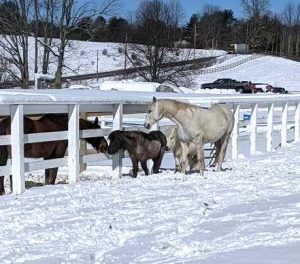
MSSPA horses adjust to paddocks
As the situation is so fluid, MSSPA leadership had to plan for the possibility of running the shelter with further reduced staff. Barn Manager Jeff Greenleaf made the decision to move as many horses as possible out of the barns and into paddocks with shelters. The horses were moved right away so that adjustments could be made if needed.
Everyone was a little nervous on Day 1. How would the horses react to being outside full-time and with new herd mates? Once we saw groups of three and four horses munching contentedly on round bales together – and one, rescue, Eddie (who arrived here three years ago as a very skinny, subdued, and neglected gelding) rubbing his whole body on his – we all relaxed a little.
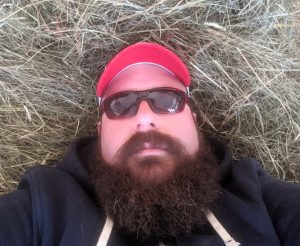
Robert Sheckler relaxes in the MSSPA hay barn
There are new routines for the barn staff and the administrative staff have been spending a lot more time in the barn to support the operation. Volunteer Coordinator Molly McMahon and I have been excited to put our boots on and get to work outside. We’re also both spending a lot of time on Facebook, email, and phone, to keep in touch with our 150+ active volunteers who miss the work and really miss the horses. Despite all of the necessary changes to human and equine routines, all of the rescued horses here continue to receive the same superior level of care regardless of the new normal.
In a lot of ways, my personal life has changed less than most people I know. Many friends are working remotely and a few have been furloughed or laid off. Their routines are very different now, especially those who have children at home, while I continue to go to work on a regular schedule.
At the shelter, I am spending more time on barn chores and with the horses. This is a real blessing. The exercise and horse time keep me calm and centered.
I’ve never been great at keeping in touch; I am more likely to ignore my phone for a day than I am to read and answer every text as it comes in. These days, though, I’m on Facebook at work to keep in touch with volunteers and spending lots of time checking in with friends and family around the country. My group of college friends even did a Zoom ‘Happy Hour’, which was lots of fun. For me, social distancing has nudged me into being a good bit more social than usual, even if it is all digital. I’m just glad that I get to scratch withers and talk to horses in real life.
Warwick Schiller is a 2020 Best Horse Practices Summit presenter and popular, international clinician with a large audience of video followers and subscribers. With the Corona virus restricting horse owner activity, he’s preparing a series of videos to highlight how now is the perfect time to develop a deeper relationship with your horses. There are, of course, no competitions to prepare for, no events to train for. Make lemonade.
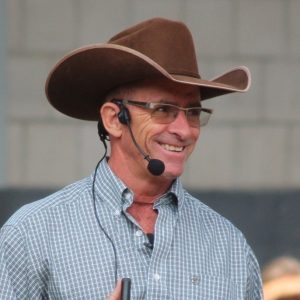
Warwick Schiller
I reached Warwick as he was wheeling a wheelbarrow across a gravel path at home in California:
Everything’s cancelled. I’ll be home for quite a long time and I’m not making any plans for the future.
We talked about Free Solo, the documentary about Alex Hannold’s ropeless ascent of El Capitan:
“I had a conversation with my therapist around the difference between Alex and others. Most people simply block things out when they get too scary. Alex, on the other hand, is fully aware that he could die at any moment and he’s able to adjust to that without freaking out.
I’d like to get to get to a place where I’m fully aware that I could die and be okay with it. I’ve gotten to a place in the last few years where I’m quite spiritual and I’m getting better at not blocking things out. But I’ve got to say, I feel like I may have taunted the gods now. (Laughing)
Consciously, I’m okay with the pandemic. But subconsciously, I think I’m more anxious. Maybe. It’s not right there front of my brain. I’m business as usual. I’m working out. Meditating. It’s raining here, so I haven’t done much with horses. When I get back with the horses, it’ll be better, too.
Julie Kenney is a Best Horse Practices Summit board member and runs Blackberry Farm in Harpswell, Maine. She writes:
It’s surreal going into town. Very few cars on Maine Street in Brunswick. Most vehicles are at the local grocery store where, for the first time in my life, there is NO toilet paper. I’ve never experienced empty shelves or making meal decisions based on what is available. It made me realize just how blessed we are to live in a first-world nation.
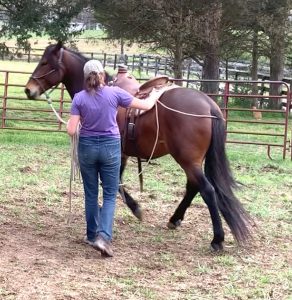
Amy Skinner stays busy on her farm.
Amy Skinner is a Best Horse Practices Summit presenter and owner of Amy Skinner Horsemanship in North Carolina. We spoke as she was in her truck, heading home to her farm:
Steve Peters is a Best Horse Practices Summit steering committee member and popular Summit presenter. He works at two Intermountain Hospitals in Utah where he is a neuropsychologist. He is the co-author of Evidence-Based Horsemanship and collaborates with Maddy Butcher on HorseHead, a blog about brain science.
I reached him at his office in American Fork, Utah:
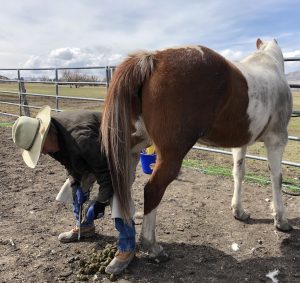
Steve Peters trims feet
Work has been stressful in an unreal, science-fiction-like environment. The hospital is creating a safe environment and has built check points, sanitizing stations, and staff are performing mandatory interviews on everyone.
Yesterday, I came home from work, skimmed through the The Essential Hoof book (by 2020 Summit presenters Susan Kauffmann and Christina Cline) and then headed out to my horses.
I have been trimming my horses’ hooves for years, but on this day, I got more lost in the task than I usually do. It’s therapeutic. It’s physical, hands-on, and there is an artistic piece to it, too, in doing their hooves. Every scrape of the rasp was helping to work out my tension. It transported me somewhere else. By the end, I was (happily) covered in shedding horse hair, hoof shavings, and I was feeling connected and centered once again.
Katrin Silva – is a BHPS presenter and well-known horsewoman in New Mexico. She’s also author of Dressage for All of Us: How to Help Any Horse Become a Happier, More Responsive Riding Partner.
I reached Katrin as she was driving to the barn:
For the welfare of all the horses at the barn, we have worked out Plan B and Plan C, in the event that I get sick or, for instance, the barn helper, Tomas, gets sick. I’ve been going there every day. My priority is to disrupt our horses’ lives as little as we possibly can.
On the hour-long drive to the barn, I have been listening to the news, but for the last 15 minutes I try to just play music, to calm down and not bring news-related angst to my horses in training.
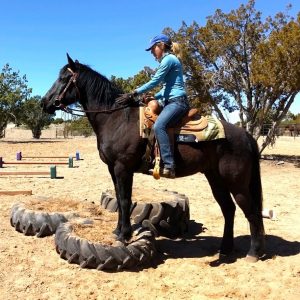
Katrin Silva at work in New Mexico
Once there, I get into the flow. Time goes by and I’m just there.
I’ve been trying to take care of myself, too. I figure of all times, now is when we should be boosting our immune systems as much as we can. I make a green smoothie every morning (my husband calls it ‘pond scum.’). I have been using a meditation app and am up to 10 minutes of meditating. I never thought I could do that.
Read Katrin’s essay on working with horses in the midst of a pandemic. (link to follow)
Jec Ballou is a popular BHPS presenter and busy clinician based in California. Ballou is the author of several horsemanship volumes, including Equine Fitness, 101 Western Dressage Exercises, and 101 Dressage Exercises. She lives in the Bay Area, south of San Francisco.
I reached Jec as she driving along Coastal Highway One, heading home from the barn, where she has nine horses in training. Highway One was quiet, she said, it’s rare that she’s seen so few cars on the route:
While I believe my work is ‘essential’ (referring to the mandate on only leaving home to provide essential services) to care for these horses, it’s not essential to train with the riders. So, for me, that’s the stand I’m taking. I work with the horses, but not the riders. That’s especially significant because several of my clients are in their 70’s.
I’ve also managed to juggle others who come to the barn, so that no one is overlapping, so that we maintain as much social distance as possible.
I’ve been riding nine horses a day – something I haven’t done in years. I’m finding that the extra work is keeping me sane. Sometimes, I also ride my bike to and from the barn. That’s about 15-20 miles each way.
Part of me is in a bit of denial. I haven’t started contemplating clinic cancellations. Most of mine are scheduled in June and July. And then part of me is the steady New Englander. But I do remember this area during the 2008 recession. It was bleak. Still, I try to steer clear of negative thoughts. They’re unproductive. I give a lot of gratitude to women, for instance, who are home, working remotely and trying to also manage their kids out of school.
Mary Ellen Spaite is a BHPS board member and psychologist who specializes in helping women who have experienced trauma. She lives in Indiana. I reached her at home:
In Indiana, the orders are to stay home unless you need to leave for something essential. The new norm is full of delays, cancellations, and rescheduling with my clients. We talk by phone and video. Is this what a slow-down means?
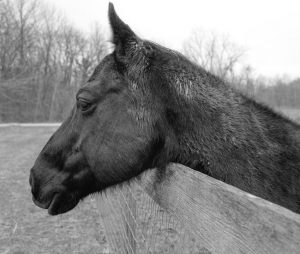
Mary Ellen’s new gelding, Percy
I am granted time and solitude right now. I can choose how, when, and with whom I interact. Having these choices feels like freedom. Life-saving freedom.
Sadly, I suffered the loss of my mother, my brother, and two beloved equines this year. I was left feeling adrift with no anchor. It was heart-breaking.
- My bright, sensitive, 24-year old Arabian showed me how to better manage the difficult symptoms of post-traumatic stress.
- My 40-plus year old donkey, up until his last breath, showed me clearly what being resolute of purpose looks like.
The similarity between horses and humans is remarkable. Yet it’s hard to find people who teach that as well as he did. The solace I received from them lives on.
Kimberly Loveless is a BHPS steering committee member and a retired DEA agent who works with wild horses. I talked with her as she “hunkered down” at her farm in Virginia:
Lately, we’ve only left the farm for feed, hay, and things we had to have. We don’t go out much anyway. Our daily life hasn’t changed at all, so that’s a blessing. I think we’re lucky to live in a rural community.
People here are doing exactly what they’ve been told to do. We have a few people who come and help with farm chores. I’ve asked them to wash their hands before and after coming to the barn and to take their temperatures before they come.
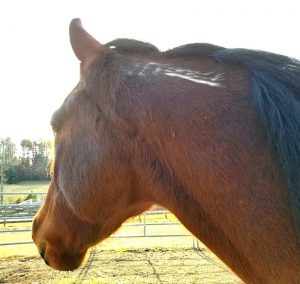
Kimberly Loveless has a new, challenging mustang
Last week, we had a silver lining incident:
Over the years, we’ve had five Labs. Our last one had a weird episode and I had to rush him to the vet. Ultimately, we had to euthanize him. He was 16. If not for the pandemic, we wouldn’t have been here. We would have been at a wedding (which was postponed) and I doubt our farm sitter would have noticed as quickly as we did that our dog was in distress. I was so glad we were here for him. It was horribly overwhelming for us, but it was also a blessing. I think it’s important that people find goodness in such a time of uncertainty.
Here’s another thing:
We have a new mustang that we brought home in November. He’s lovely but very tough to reach. Because of the Corona virus lull, I’ve really been kind of able to stick to my guns in how I bring him along. I’m able to take the time it takes. He’s a very shut down horse and I’ve been able to experiment with positive and negative reinforcement. I don’t have the pressure now that the vet or farrier might put on me to make more progress.
Maddy Butcher is director of the Best Horse Practices Summit and founder and publisher of Cayuse Communications. I write to you as I’m parked outside my closed gym, which, thankfully, still has WiFi that emanates from the building. (I don’t have internet at home).
I live alone in rural southwest Colorado. The virus has yet to reach my tiny community, but things feel wwaayy different. Isolation is mandatory now, not of free will. My head is periodically spinning and not. Life is calm. And yet.
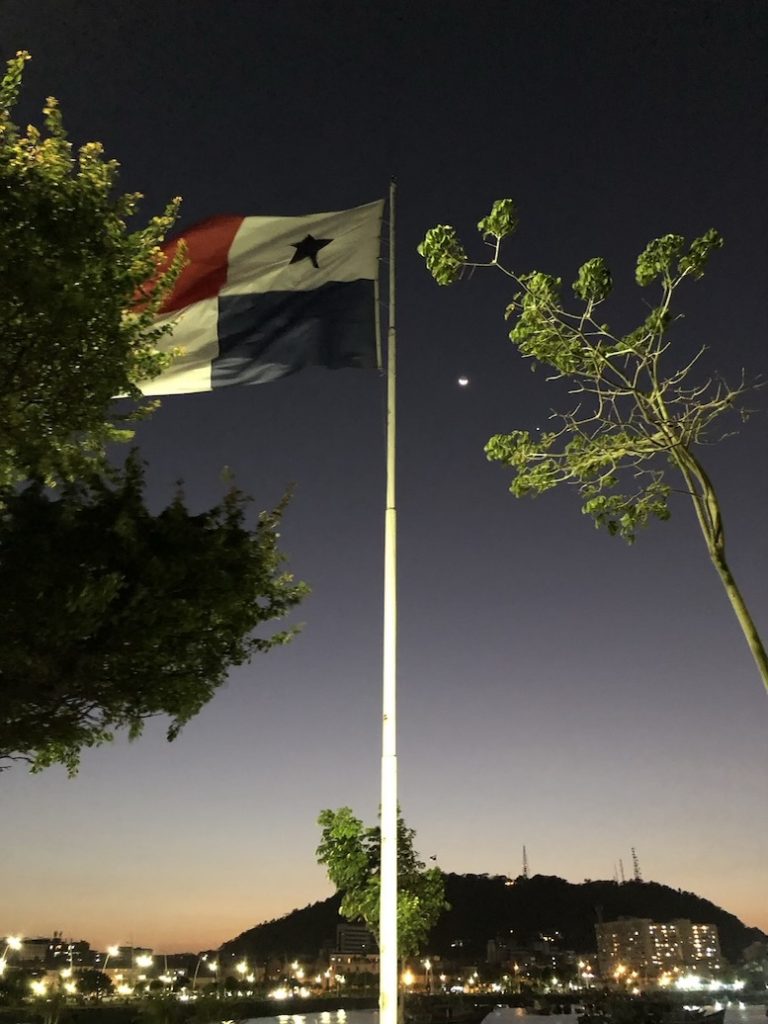
A trip to Panama is now impossible
I try to talk with my sons every day. One is in Puerto Rico, one in Washington, D.C., one in Panama – we all got together for four days in Panama last month. That’s impossible now, so I’m thankful we united then.
I try to exercise a lot – that includes walking, hiking, and, of course, riding. I’m eating well and drinking maybe one beer or glass of wine per evening.
It is the talking with others that is helping the most with my anxiety. That and staying busy with work. Like a lot of horse folks, I’m an introvert. But the pandemic has compelled me to reach out much more than I usually do. I crave hugs, but take comfort in simply seeing friends and acquaintances during my brief and ‘socially distance’ encounters in town.
There is SO much out there I cannot control. So, I’m trying to take heart in the things I CAN control, like my health, fitness, state of mind, connection with others. I’m trying to be kind to myself and let that emanate out to my loved ones and the greater universe. Call me corny, but it’s where I’m at right now.
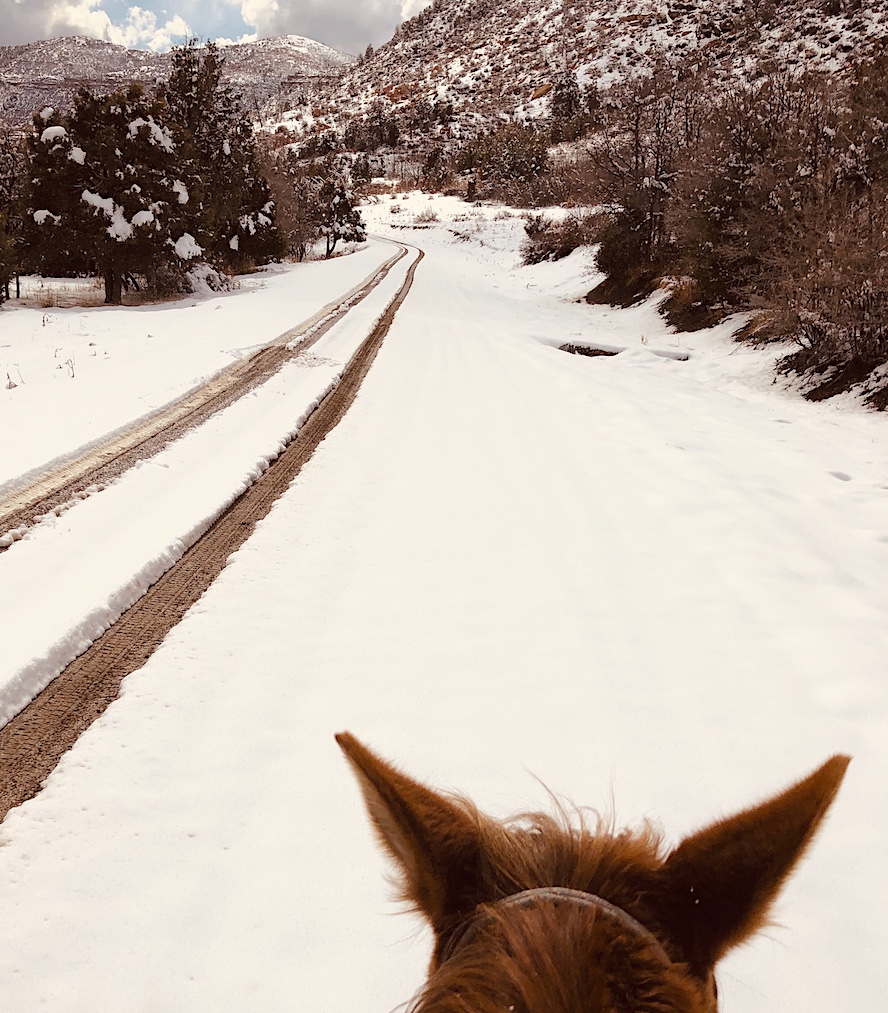
On a recent ride. Photo by Maddy Butcher
Here, in WI, we are now on a stay at home order. It isn’t much different than what I normally do except that the kids are home with me all day. We spend time with the horses, take walks, and enjoy our life in the forest as much as possible.
My work with the college is all being done from home. We are on Spring break until April 6. We have not heard how graduation proceedings in May will take place.
Our services at UP THERE have ceased to the public but we connect with others virtually. I am using this time to do some virtual professional development, I recently started the Horse Powered Reading training this week and will begin my HERD EFL level 2 work in April.
Our small boarding facility is still gathering for group ground work and walks or rides but in small numbers (maximum of four) Seniors one day, young people another day. We are keeping the recommended social distance and hand sanitizing. Everyone is getting the much needed companionship of their horse, and getting to be out side in our beautiful spring Arizona weather.
Life in GA is a bit different during the shutdown, but not much because we live out from town and keep our horses plus boarding some others on the place. No more eating out unless we find a place doing carryout. With a wet Spring coming early to this part of the country, we have already had to mow several times. I must say, things look better than they usually do around here because we are doing a lot of mowing. At least they look better for a few days, then it all needs to be done again. The horses are shedding copious amounts of hair which is more than the birds want/need, so we also rake up piles of hair to compost along with the manure. Part of the garden is planted already and more is ready to be. And of course, there is plenty of time to ride!